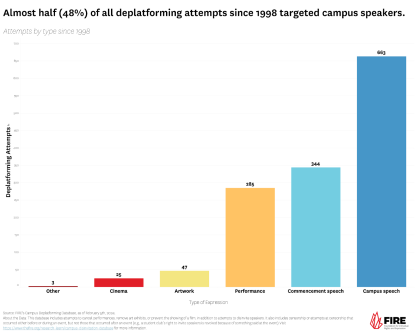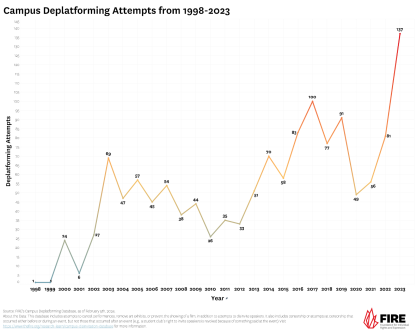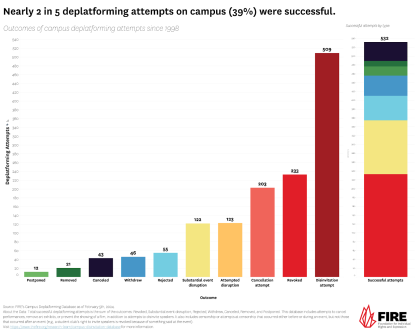Table of Contents
Introducing FIRE’s Campus Deplatforming Database

Is cancel culture real? If so, how can we know for sure if society is getting more or less censorial? One way to answer these questions is to gather and analyze data, which is exactly what FIRE has done.
FIRE is excited to announce the Campus Deplatforming Database, an updated and enhanced version of the Campus Disinvitation Database. In addition to tracking attempts to disinvite speakers from campus, the updated database now includes attempts to cancel performances, take down art exhibits, and prevent the screening of films.
In expanding the focus of the Campus Disinvitation Database, FIRE performed a full audit on all existing entries. First, we reviewed the news sources provided for each entry and removed any dead links. Next, we conducted searches for additional news coverage on each entry and decided whether each entry should still be included in the updated and expanded database. We removed a total of 24 disinvitation attempts (which can be found here).
We then reviewed FIRE’s case history, searched online petition websites, and searched for unrecorded deplatforming attempts of speakers who have frequently been targeted by disinvitation campaigns. The total number of disinvitation campaigns targeting speakers that FIRE has recorded increased from 552 to 1,007, including 663 campaigns targeting a guest speaker invited to campus and 344 campaigns targeting a commencement speaker.
Finally, to expand the database to include deplatforming attempts that targeted performances, art exhibits, or films, we reviewed the following sources:
- FIRE’s art censorship report, “One Man’s Vulgarity”: Art Censorship on American Campuses.
- The College Fix’s Campus Cancel Culture Database.
- National Review’s Cancel Counter.
The research team also searched for news coverage of deplatforming attempts targeting performances, art exhibits, or films on college and university campuses and recorded 357 additional deplatforming attempts. A large percentage of these attempts come from The Cardinal Newman Society’s roughly two decade-long campaign to urge colleges and universities — mostly Catholic schools — to cancel scheduled performances of the play, “The Vagina Monologues.”

From 1998 to Feb. 5 of this year, we recorded 1,367 deplatforming attempts in the Campus Deplatforming database. Roughly three-fifths of the recorded deplatforming attempts (809, or 59%) occurred from 2014 to the present, and almost a quarter (330, or 24%) occurred from 2020 to the present. Last year alone, we recorded a record-setting 137 deplatforming attempts, which amounts to roughly 10% of all recorded deplatforming attempts since 1998.

Overall, 532, or 39%, of the 1,367 recorded deplatforming attempts succeeded. This includes 12 postponements of an event; 21 removals of artwork; 43 cancellations of art exhibits; performances, or film screenings; and 46 withdrawn, 55 rejected, and 233 rescinded speaking invitations. It also includes 122 substantial event disruptions: incidents when either a heckler’s veto occurred or when the student government and/or administrators made it exceedingly difficult for event organizers to hold the event.

The Campus Deplatforming Database also expands on the details provided about each deplatforming attempt, compared to its predecessor:
- The descriptions of the controversial topic or topics that generated a deplatforming attempt were revised so that they are more consistent with the controversial topics tracked in our Scholars Under Fire Database.
- A deplatforming attempt can now have multiple sources. The distinction between “on-campus” and “off-campus” attempts remains, but “on-campus” sources now include administrators, faculty, stakeholders, student groups, and students; “off-campus” sources now include activists, alumni, corporations, the general public, politicians, and public figures.
- Whether a petition supporting or opposing the deplatforming attempts was circulated is now noted, and direct links to any petitions are provided when available.
- The public response, if any, to the deplatforming attempt from the administration of the college or university is now included in the database.
Explore the Campus Deplatforming Database in full.
View the revised methodology.
Recent Articles
FIRE’s award-winning Newsdesk covers the free speech news you need to stay informed.

Texas tramples First Amendment rights with police crackdown of pro-Palestinian protests

Here’s what students need to know about protesting on campus right now

Kansas takes a stand for intellectual freedom


